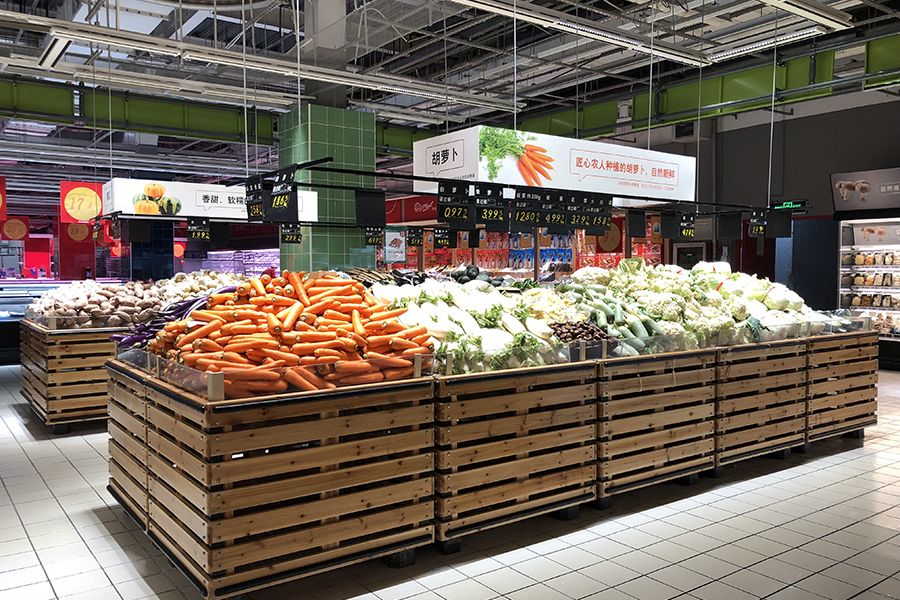Alibaba has announced it will pay $3.6 billion to acquire a majority stake in Sun Art Retail Group – one of China’s largest operators of supermarkets and hypermarkets.
The Hangzhou-based tech giant initially invested in Sun Art back in 2017 as part of a strategic alliance with fellow shareholders, French retailer Auchan and Taiwanese conglomerate Ruentex. That alliance was aimed at digitalizing Sun Art stores and creating a more personalized customer experience.
Alibaba will up its existing holding in Sun Art to 72% as a result of this latest deal, with it acquiring much of its newly enlarged stake from Auchan.
Underlining its plans for the hypermarket chain, the tech company said in a statement that the “transaction demonstrates Alibaba’s continued commitment [to] its ‘new retail’ strategy by further integrating online and offline resources in China’s retail sector.”
‘New retail’ refers to physical shops that integrate digital technologies such as mobile payments, robotics, and on-demand delivery in an effort to improve efficiency and customer service.
In a statement, Alibaba chairman and CEO Daniel Zhang said his company’s initial 2017 investment in Sun Art was an “important step” in its broader new retail strategy.
“The alliance we formed with Auchan Retail and Ruentex was instrumental in building a robust infrastructure to create opportunities and value in China’s retail sector. Sun Art has achieved impressive results in its digitalization, and pursued promising synergies with businesses across the Alibaba digital economy,” he said.
“As the Covid-19 pandemic is accelerating the digitalization of consumer lifestyles and enterprise operations, this commitment to Sun Art serves to strengthen our new retail vision and serve more consumers with a fully integrated experience.”
According to Alibaba, Sun Art operates close to 500 stores across China. All of these have been integrated with the tech firm’s food e-commerce platforms Taoxianda and Tmall Supermarket, which offer fresh food and general grocery deliveries. Sun Art is also able to provide one-hour and half-day delivery thanks to its tie-ups with Alibaba’s logistics unit Cainiao and its on-demand restaurant delivery service, Ele.me.
Alibaba launched its own new retail grocery chain, Freshippo, in 2015 to target China’s ‘Millennial’ urban middle classes.
Also known as Hema, the tech-driven supermarket offers its customers an online-to-offline experience where they can browse products both on the Freshippo app, and by visiting its physical outlets. Shoppers can use their smartphone to scan product QR codes for traceability or nutritional information, pay for their purchases at unmanned checkouts using digital wallets — such as Alipay, operated by Alibaba affiliate Ant — and opt for express home delivery.
Beyond Meat partnered with Alibaba and Freshippo earlier this year to bring its plant-based protein products to Chinese shoppers. Read more here
Freshippo also offers customers a variety of premium services such as in-store dining, where shoppers can have their freshly bought seafood prepared for them to eat there and then – with robot waiters on hand to serve meals and clear away dirty dishes.
Alibaba was among the most active agrifood investors in China last year, according to AgFunder’s China AgriFood Startup Investing Report 2019 [disclosure: AgFunder is AFN‘s parent company.]
The company and fellow tech giants Baidu and Tencent together backed Chinese agrifood fundings worth over $640 million during 2019.
Alibaba’s investments last year included Nice Tuan (also known as Shi Hui Tuan), a group-buying platform for fresh produce, as well as dairy-focused online marketplace Tianxianpei. The tech firm also participated in a $224 million late-stage round raised by Ubox, which operates a network of internet-enabled vending machines.
However, 2019 represented a substantial rowing back on their investments in the sector during the previous year, which was characterized by a number of outsize deals.
Tencent and Alibaba alone accounted for $2.7 billion in Chinese agrifood startup funding in 2018 – almost half the sector total. They were the second and third most active investors in the space, respectively, by number of deals, with only Matrix Partners making more investments.
Got a news tip? Drop me a line at [email protected]





